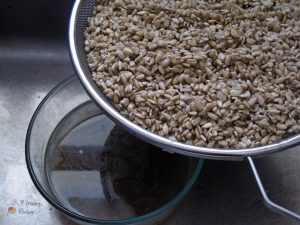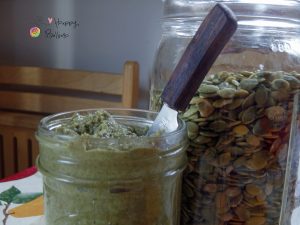Traditional Method for Soaking Nuts & Seeds
Tara Carpenter, NC.
Nutrition Consultant for people regaining natural gut microbiome after yeast, bacterial, viral infections.
Originally published on April 6, 2014.
Nuts and seeds are nutrient-dense and easy to munch; they also contain enzyme inhibitors and plant toxins, like phytic acid, that are shown to weaken digestion, steal nutrients, and cause food sensitivities. This is why best to soak them in warm, salty water.
If this soaking step is skipped, the inhibitors inside nuts and seeds can prevent gut from absorbing nutrients in an otherwise nutrient-rich food. If you struggle with poor digestion or a health condition like osteoporosis then you want to do all you can to keep your gut strong. The most efficient way to minimize these harmful enzyme inhibitors and toxins is to make your own nuts and seeds with the recipe below.

Look at that blackish water from soaking sunflower seeds!
Traditional Method for Soaking Nuts & Seeds
1) Choose raw, organic nuts or seeds.
2) Place in large, glass mason jar or stainless steel container.
3) Add warm water (80-85 F.) to cover nuts and seeds; shake jar gently.
4) Dissolve sea salt into water.
- 1 Tbsp. sea salt per 4 cups of almonds, hazelnuts, Brazil, pine nuts, macadamias, cashews
- 2 Tbsp. sea salt per 4 cups of pecans, walnuts, pumpkin seeds, sunflower seeds
5) Cover loosely with lid. Put in warm spot (70-72 degrees) for 7-15 hrs. If you soak cashews, they only need 6 hours or get slimy. Weston A. Price says the longer a nut/seed soaks, the more phytic acid is removed; up to 18 hours recommended. I sell incubator kits to keep temperatures steady.
6) Drain in a fine-meshed strainer, rinse well.
7) Enjoy nuts and seeds as they are or sprout and/or dehydrate them.
- Dehydrating: Place nuts/seeds in single layer on tray in dehydrator (or sun) at 115 degrees for 8-24 hrs. until crispy. Dry 100% to prevent molding. The longer soaked, the longer to dehydrate.
- Sprouting: Do small batches at once; rinse/drain every 6-8 hrs. until taste good. Place in clean, dry jar in fridge.
Tips & Tricks
The salty taste of this recipe lends itself well to additional seasonings. Below are my favorite combinations. Note: add seasonings before they go in dehydrator (not at soaking stage).
- Savory: tamari, sea salt
- Sweet: cinnamon/stevia, vanilla/stevia
- Salt ‘n Vinegar: apple cider vinegar/sea salt
- Indian: curry powder, cayenne, garlic
- Italian: basil, rosemary, thyme, oregano
- Cajun: paprika, garlic powder, onion powder, black pepper, cayenne, oregano, thyme
Nuts, with exception of almonds, are not recommended if have a digestive issue (i.e. constipation, bloating) or on B.E.D. If you have an active viral infection, then best to avoid nuts/seeds due to high levels of arginine.
References
Fallon, S. (2001). Nourishing Traditions. Washington, DC: New Trends Publishing, Inc.
Fallon, S. and Enig, M. (2000). Be Kind To Your Grains…And Your Grains Will Be Kind To You. The Weston A. Price Foundation. Retrieved from https://www.westonaprice.org/food-features/be-kind-to-your-grains
https://caloriebee.com/diets/Food-Enzyme-Facts
https://blog.radiantlifecatalog.com/bid/69542/That-s-Nuts-A-Complete-Guide-to-Soaking-Nuts-and-Seeds
Nourished Kitchen. (2009). Sprouted Grain: Benefits, Preparation and Recipes. Retrieved from https://nourishedkitchen.com/sprouted-grain/
Wellness Mama. (2016). How (and why) To Soak Nuts & Seeds. Retrieved from https://wellnessmama.com/59139/soaking-nuts-seeds/
This blog post may contain affiliate links, read here to learn more.
May all bellies be happy!



